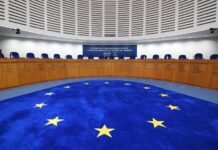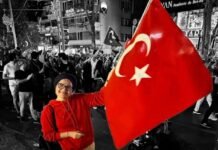
Reporters Without Borders (RSF) on Wednesday called on Turkish authorities to guarantee the safety of journalists during military operations after Turkish soldiers injured two Syrian Kurdish journalists in the border town of Tal Abyad in northeastern Syria on Nov. 2.
According to a report by Kurdistan 24, two journalists who work for Syrian Kurdish news agency ANHA/Hawar, Ibrahim Ahmad and Gulistan Mohammed, sustained injuries while covering clashes between Turkish forces and Kurdish militants near Tal Abyad.
“The condition of Ahmad, who was hit in the leg, is stable, but Mohammed’s condition is much more worrying because the bullet struck her in the face,” RSF said.
Moreover, Delshad Judy, ANHA editorial director, told the Committee to Protect Journalists (CPJ) that Mohammed and Ahmad were covering the effects of the Turkish forces shelling of Tal Abyad’s Al-Munteh neighborhood. The area had come under heavy mortar fire the previous night when a live round hit Ahmad in his left arm while Mohammed was shot in her right cheek.
According to Judy, the two journalists were immediately transferred for treatment at the Tal Abyad General Hospital. “Ahmad is still recovering, but Mohammed’s condition was serious, and she was subsequently transferred to the Manbij Specialist Hospital, where she underwent surgery and was placed in intensive care for 24 hours,” the editorial director revealed.
“She has been stabilized, but she cannot talk because of the injury [to] her jaw.”
ANHA told the RSF that the Turkish forces were just a few dozen meters away from the reporters – close enough to know from their cameras and microphones that they were journalists.
Mohammed has been a reporter for ANHA, which is affiliated with the US-backed Syrian Democratic Forces, since November 2016. A correspondent in the Tal Abyad area, she has covered mainly women’s issues, according to Judy. Ahmed has also worked as a reporter for ANHA since November 2016, covering social and political problems in the Tal Abyad area.
Sophie Anmuth, the head of RSF’s Middle East desk, said that “combatants must respect UN Security Council Resolution 1738 on the safety of journalists in armed conflicts, and must not target them or detain them as if they were participants in the conflict.”
“The Turkish authorities must accept that this imposes obligations on them, both with regard to their own armed forces and the groups they support,” she added.
According to RSF, Turkish forces have also been fighting Syrian Kurdish forces in northern Syria’s Afrin region, 250 kilometers to the west, where Turkey’s military intervention began in January and where Turkish-backed Syrian government forces have carried out a series of abductions of journalists this year.
Moreover, the fate of three journalists which the Turkish-backed Free Syrian Army abducted near Manbij remains unclear. According to the CPJ, on June 22, 2018, the FSA detained Kaniwar Khalef and Essam al-Abbas, camerapersons for the Dubai-based news agency Arab 24, as well as Hassan Khalef, their camera assistant.
Turkey is ranked 157th among 180 countries in the 2018 World Press Freedom Index released by Reporters Without Borders (RSF). If Turkey falls two more places, it will make it to the list of countries on the blacklist, which have the poorest record in press freedom.
Turkey is the biggest jailer of journalists in the world. The most recent figures documented by SCF show that 239 journalists and media workers were in jail as of October 31, 2018, most in pretrial detention. Of those in prison 170 were under arrest pending trial while only 69 journalists have been convicted and are serving their time. Detention warrants are outstanding for 148 journalists who are living in exile or remain at large in Turkey.
Detaining tens of thousands of people over alleged links to the Gülen movement, the government also closed down some 200 media outlets, including Kurdish news agencies and newspapers, after a coup attempt in Turkey on July 15, 2016.














